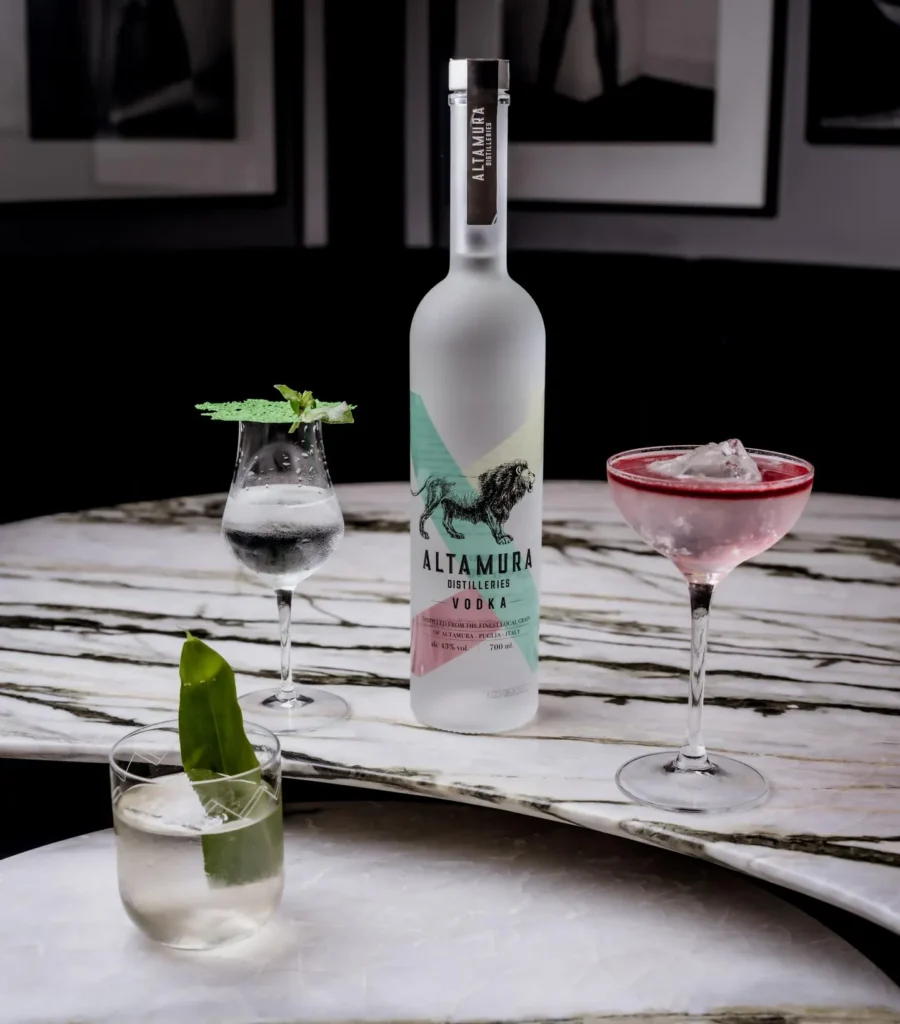Mar 10, 2024,10:13am EDT
Blue-haired Frank Grillo found inspiration in the midst of a pandemic-induced cooking spree, exploring specialties from Southern Italy’s Puglia region. Amid his culinary adventures, the 58-year-old decided to deviate from the usual pantry flour and instead experimented with an ancient wheat variety renowned for producing the only bread in the world with a protected designation of origin.
Venturing to his local Whole Foods, Grillo acquired flour from the Altamura region, known for its distinct flavors like aniseed, pepper, and lemon zest. As he baked his first loaf, a transformative idea struck him. Holding up the bread in his kitchen, he exclaimed, “If you boil that instead of baking it, we could be drinking it.” Intrigued by the absence of distillation from this wheat, Grillo and his best friend and business partner, Steve Acuña, launched Altamura Distilleries from Puglia.
The duo invested a little over $500,000 from their savings to establish the business, refine a vodka recipe, and produce their initial batch. Altamura Distilleries is unique in that it has no institutional investors; instead, friends and family collectively hold a 40% stake, contributing a $1.6 million investment.
During the second phase, the founders faced significant decisions, including postponing the construction of their distillery in Puglia due to cost considerations. Initially, Altamura vodka was distilled by an independent manufacturer in Poland, using wheat directly imported from Italy. However, the company has now secured a distribution center in Ostuni and plans to set up its gin experiment there. Looking ahead, Altamura aims to open its vodka and whiskey distillery in Altamura city by the next year.

The Grain Tour: The Roman poet Horace wrote about Altamura's durum wheat as far back as 37 BC.BIGSTOCK
Since its debut last year, Altamura vodka has quickly expanded its reach, now available in seven countries including the U.S., U.K., and India. In 2023, the brand sold just under 50,000 bottles, generating $550,000 in sales. However, founder Frank Grillo anticipates a significant uptick this year, with projected revenues nearing $2 million.
The spirits industry, particularly vodka, boasts high-profit margins, with net margins often exceeding 70%. Successful brands frequently attract lucrative deals from larger conglomerates, as seen with the recent sale of Finlandia to Coca-Cola’s bottling company for $220 million.
Investors eyeing the spirits sector have seized opportunities in startup brands, with some acquisitions reaching multiples of up to 30 times earnings. Aviation Gin, backed by actor Ryan Reynolds, was acquired by Diageo for $610 million in 2020, while George Clooney and Rande Gerber’s Casamigos tequila brand fetched a staggering sum of up to $1 billion.
Although Altamura Distilling is still in its early stages, it boasts impressive profitability, with estimated net profit margins exceeding 50%. Grillo emphasizes that vodka production is straightforward compared to other aspects of the business, such as sourcing bottles and packaging materials.
Grillo’s journey into the spirits industry began with a desire to live in Italy. After a career in marketing, he relocated to Puglia with his husband, drawn by the region’s stunning landscapes and tax incentives. Inspired by the region’s culinary heritage, Grillo explored the possibility of distilling vodka from ancient wheat traditionally used for bread-making—an idea that eventually led to the creation of Altamura vodka.
While the concept of distilling wheat into vodka was unfamiliar in southern Italy, Grillo recognized the potential of utilizing the region’s durum wheat for distillation. Despite initial challenges in production logistics, including bottle sourcing and geopolitical shifts affecting suppliers, Altamura Vodka has emerged as a testament to innovation and tradition in the spirits industry.

Clear Vision: Most vodkas tout being odorless and tasteless. “We felt like we had to let you taste the wheat,” Grillo explainsLATEEF PHOTOGRAPHY
He’s been on a mission to redefine vodka, and Italy’s finest bars and mixologists worldwide have taken notice. Altamura’s frosted bottles adorned with a lion symbol grace the shelves of top cocktail destinations, garnering attention from the most discerning palates.
In Barcelona’s Paradiso, ranked No. 1 on The World’s 50 Best Bars list in 2022, owner Giocomo Giannotti attests to Altamura’s distinctiveness. Customers notice a difference, he says, as the vodka enhances classic cocktails like martinis, espresso martinis, and cosmopolitans.
In New York City, mixologist Takuma Watanabe of Martiny’s and L’Americana pairs Altamura with avocado and lime, praising its texture and smoothness. Grillo’s focus on influential bartenders stems from his agency background: “Know your customer and know the job you want to do.”
Grillo’s dedication to Altamura’s essence led to meticulous distillation. Unlike most premium vodkas, which undergo multiple distillations for neutrality, Altamura’s process highlights the wheat’s natural flavors. Grillo settled on three distillations and five filtrations, allowing the sweetness and creaminess of Altamura’s durum wheat to shine.
Partnering with the Cappiello family, Altamura celebrates the rich heritage of Altamura wheat cultivation since the late 1800s. Andrea Cappiello reflects on the collaboration’s journey, fueled by determination and passion.
Looking ahead, Altamura plans to introduce ready-to-drink cocktails, gin, and whiskey. Grillo envisions an American-style wheated whiskey using durum wheat, inspired by Scotch production methods. Flavored vodkas, such as tomato and basil, pay homage to Puglia’s authenticity.
For Grillo, crafting whiskey and flavored vodkas is a natural progression, driven by a commitment to provenance. As Altamura expands globally, its legacy of innovation continues to inspire drinkers worldwide.

